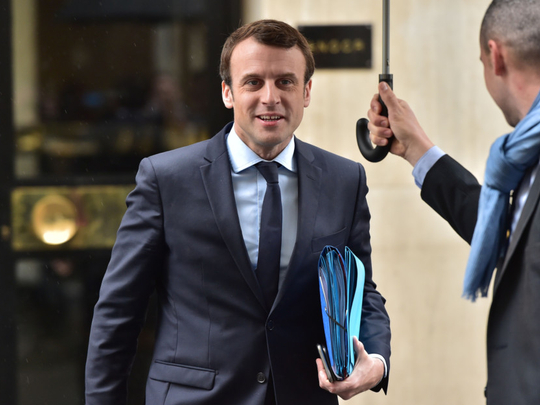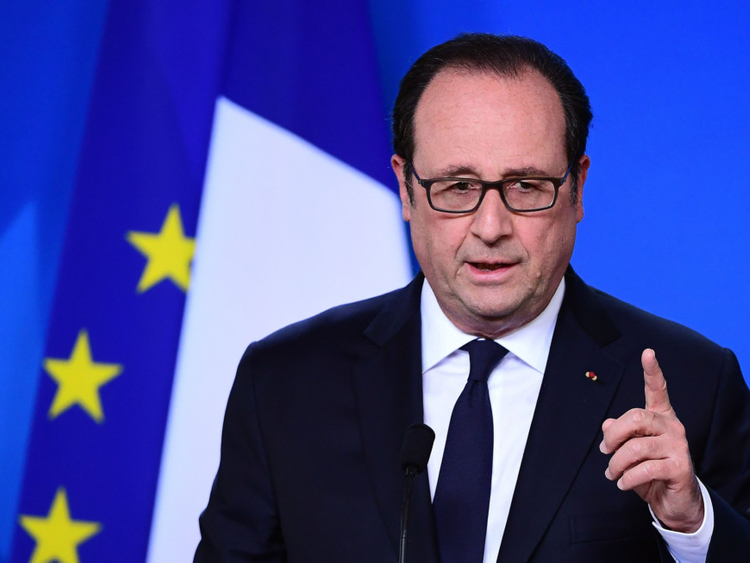
The result of the first round of the French presidential election, with Emmanuel Macron (23.5 per cent) in pole position for the second round before populist leader Marine Le Pen (21.5 per cent), is a sad message for all those who thought President Francois Hollande’s five-year term was disastrous enough to turn the page.
Yet, Macron’s win is effectively Hollande’s victory. After having successfully torpedoed former prime minister Francois Fillon’s candidacy — thanks to perfectly coordinated attacks — Hollande just had to wait for his pawns to move by themselves and see.
Thus, the candidate of the Right and the Centre did not make it. If the ‘affairs’ have reduced Fillon’s prior advance by about seven points, it is not enough to understand what happened to an election that “the Right could not lose”. Whereas 71 per cent of the French consider that far-left ‘fourth-man’ candidate Jean-Luc Melenchon (19 per cent) was “best positioned to understand the problems of the French”, the signal of a growing fracture within the French society appears crudely. And Fillon missed it — a split between an urban bourgeoisie impressed by Macron’s fantastically efficient marketing operation and desperate peripheries’ inhabitants and agriculture men who are the leftovers of globalisation, and support Le Pen.
Right now, Macron’s first test should have been transformed. The campaign of these coming days will point out at the continuity between Hollande and Macron; Le Pen will try and claim that “she is the candidate of the people against the system”; and Macron would want to drive home the point that he is “the one to renovate French political life”. Opinion polls have already forecast a victory for Macron over Le Pen (59 per cent-41 per cent) — notably, thanks to the worn out concepts of ‘Republican Front’ and ‘compulsory fight against fascism’.
It is likely Macron will make it — although surely not with such margins. First, because only half of Fillon’s supporters, despite the leader’s recommendations, would vote for him, with the other half splitting equally between Le Pen and abstention. Second, assuming some scores cancel each other, Melenchon will not switch with his whole troops towards Macron. Last, if media continues to play the show of a Macron already elected, and the later goes on doing communication mistakes, some room remains for uncertainty — even though absurdities of Le Pen’s programme should theoretically make her ineligible to lead the country. To conclude, if Macron claims he is making “the old political system explode”, it just remains to be confirmed in the polls.
But in the end, what should a Right elector think when listening to Macron declaring “there is no French culture”, or “terrorism is something we should get accustomed to”? As for international policy views, which are a condensate of American-inspired neo-conservative thoughts, or ethical values, which are deeply marked by minorities lobbying out of fashionable but disconnected Paris areas, will that make the Right vote for him? This is what was previously described by the very same people who now call on voting for him as “so far from real life”, “a nonexistent person when it comes to action”, and “the author of the delirious economic programme of 2012”.
Can one re-build a country based on such an uninspired view?
Macron sent to the carpet the two main political parties that have reigned over France for the last 30 years — and for sure, the main responsibility falls on them. Yet, creating value from a scratch will require more than empty phrases walking off-ground, when the only valuable debate should have been on what are the reforms that France needs, and which path to follow?
Next Sunday, as the French go back to the polls, many will prefer to go fishing. Who would blame them, if not an inside feeling that between two evils, the worst one should be avoided.
Because the worst is still to come for Macron — and incidentally, also for Le Pen should she win. How can a majority in a parliament of 289 seats be forged when the country is divided into four parts, and the second-round winner, with no deeply-rooted party backing him, is partly elected by people who will vote against him in the successive parliamentary elections? How can a coherent force emerge from a ‘two-round majority’ process, which implies that alliances are concluded within the two rounds?
Actually, the major loser of this election are the institutions of the Fifth Republic, which have proven to be strong pillars of French successes since 1958. Jacques Chirac and Nicolas Sarkozy presidencies had paved the way for what will occur soon, the revenge of political parties with their usual games and combinations. Hollande here again is a winner.
One shouldn’t pre-judge future — but whoever is elected will have to compose with a majority. Le Pen won’t have it and if Macron, it will be at best a ‘moving’ one, making the former Right explode. Meanwhile, those French willing to choose anyhow between dark clouds and insoluble question marks will have to vote against their conscience — a price to be paid for democracy?
Luc Debieuvre is a French essayist and a lecturer at IRIS (Institut de Relations Internationales et Strategiques) and the ‘FACO’ Law University of Paris.













